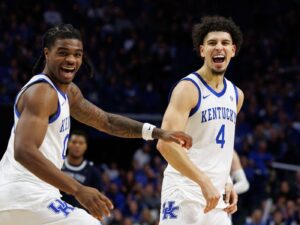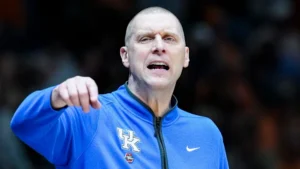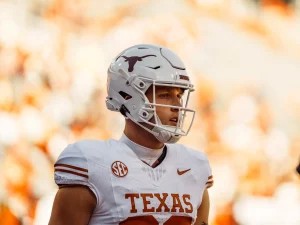
Miami Hurricanes Linebacker Adarius Hayes Released from Hospital After Fatal Crash
In a tragic incident that has captured the attention of both the Miami Hurricanes football team and the wider college football community, linebacker Adarius Hayes has been released from the hospital after being involved in a fatal crash. The crash, which occurred just days ago, has left the university, fans, and teammates grappling with profound grief and confusion. Hayes, who had been a key player on the defense for the Hurricanes, is now recovering physically from the crash, but the emotional scars will likely take much longer to heal.
This incident raises numerous questions about the safety of student-athletes, the challenges they face off the field, and the potential long-term impact on those involved in tragic events like this one. Through a detailed examination of the circumstances surrounding the crash, the life of Adarius Hayes, the reaction of the Miami Hurricanes football program, and the impact on the community, we will try to gain a better understanding of the tragedy and its far-reaching consequences.
On the night of the crash, Adarius Hayes was driving his vehicle along a stretch of road in Miami, not far from the university’s campus, when the accident occurred. According to local authorities, the crash took place in the early hours of the morning when the roads were less crowded. Hayes’s car collided with another vehicle, and reports indicate that the driver of the other car was killed on impact. While the circumstances of the crash are still under investigation, early reports suggest that speed may have been a factor, but no official determination has yet been made.
The Miami-Dade police department and local paramedics responded promptly to the scene. Hayes was quickly transported to a nearby hospital in serious condition, while the driver of the other car was tragically pronounced dead at the scene. The family of the deceased has requested privacy during this difficult time, and authorities have not released further information about the identity of the person who lost their life.
As Hayes was rushed to the hospital, concerns about his physical well-being quickly became the focus of attention. He had sustained injuries that were serious but not life-threatening. Fortunately, after receiving immediate medical attention, Hayes underwent surgery to treat the injuries and was eventually stabilized. Doctors reported that he was expected to make a full recovery physically, although the emotional and psychological toll of the accident would likely linger for much longer.
After spending several days in the hospital, Adarius Hayes was released from medical care, and his recovery journey began in earnest. While physically he was expected to recover, the emotional aftermath of being involved in such a devastating crash would undoubtedly present a much greater challenge. Teammates, coaches, and friends from the football team rallied around Hayes in support, showing solidarity during one of the toughest moments in his life.
The Miami Hurricanes football team, which had been gearing up for a crucial season, faced an immediate dilemma. Hayes, a key member of their defensive lineup, was not only a great player but a beloved teammate. His absence from the team’s activities, coupled with the intense emotions surrounding the accident, left the program in a state of shock and uncertainty. As a result, Coach Mario Cristobal, the team’s head coach, made a public statement expressing the university’s collective support for Hayes.
“We are incredibly relieved that Adarius is expected to make a full physical recovery,” Cristobal said in a statement. “But there is no denying the deep emotional impact that this tragic event has had on him, his family, and the entire team. Our primary focus right now is supporting Adarius in every way we can, both on and off the field.”
The team’s practice schedules and even the upcoming games were adjusted to allow players and staff members time to process the tragedy and offer their support to Hayes. His teammates, particularly those closest to him in the locker room, have rallied together, with many offering prayers and words of comfort for their friend. These efforts to provide emotional and psychological support to Hayes highlight the importance of team camaraderie and mental health in the world of collegiate athletics.
To understand the weight of this tragic event, it is important to recognize the person at the center of the story: Adarius Hayes himself. Born and raised in the heart of Florida, Hayes was no stranger to the world of sports from an early age. His high school career was marked by his incredible work ethic, natural talent, and leadership on the field. He quickly earned a reputation as a top-tier linebacker with a relentless pursuit of excellence and an unwavering commitment to his team.
Hayes’s time at the University of Miami began when he was recruited to play for the Hurricanes, and from the moment he arrived, it was clear that he was destined for greatness. As a freshman, Hayes impressed coaches and teammates alike with his agility, strength, and football IQ. His ability to read opposing offenses and make critical plays was evident from the beginning. By his sophomore year, he had become a starter on the team’s defense and was showing signs of becoming one of the premier linebackers in the nation.
Off the field, Hayes was known for his humility, discipline, and strong character. He had become a role model for younger players on the team, regularly taking time to mentor incoming freshmen and offering guidance to teammates who were facing their own challenges. His leadership both on and off the field made him a beloved figure within the Hurricanes’ program.
Hayes was on track to have a breakout season in 2025, with many analysts predicting that he could be a future NFL draft prospect. His combination of physicality, intelligence, and leadership had made him one of the most promising young players in college football.
But beyond his athletic prowess, Hayes was a deeply caring person. His involvement in community service and his commitment to giving back to those less fortunate showcased his character. He regularly participated in charity events, visiting local schools and hospitals, and encouraging young people to pursue their dreams, both in sports and in life.
For Hayes, the road to recovery will undoubtedly be a difficult one. While he is physically on the mend, the emotional trauma of being involved in a fatal crash is not something that can be easily overcome. The loss of life, particularly when it involves an innocent victim, can have a profound impact on a person’s psyche. Hayes will likely have to navigate feelings of guilt, grief, and confusion as he comes to terms with what transpired.
The Miami Hurricanes football program, aware of the emotional toll this incident has taken on Hayes, has made significant efforts to provide him with the support he needs. The university has connected Hayes with counseling services and has provided him with a network of mental health professionals to help him cope with the aftermath of the accident. Teammates have also been instrumental in offering emotional support, checking in on Hayes regularly and making sure he feels supported during this difficult time.
Mental health awareness in college athletics has become an increasingly important topic in recent years, with many programs recognizing the immense pressure that student-athletes face both on and off the field. The University of Miami, like many other universities, has made significant strides in offering mental health resources to its athletes, and in the wake of this tragedy, the importance of these services has never been more apparent.
The Miami Hurricanes football program has faced significant challenges in the wake of this incident. While the team remains focused on its upcoming games and the goal of achieving success on the field, it is impossible to ignore the emotional and psychological impact of what has transpired. As a team, they must come together to support each other through this difficult time.
The reaction from the broader college football community has been one of support and compassion. Coaches, players, and fans from around the country have reached out to express their condolences and support for Hayes and his family. The college football world is known for its fierce rivalries and competitive spirit, but when tragedy strikes, the bonds of community and solidarity are often stronger than any rivalry.
Miami fans, many of whom had followed Hayes’s career with excitement and optimism, have united in their support for the young linebacker. Social media platforms have been flooded with messages of encouragement, prayers, and hopes for his swift recovery. It is a testament to the power of sports to bring people together, even in the most difficult of circumstances.
The tragic accident involving Adarius Hayes has cast a dark shadow over the Miami Hurricanes football program. While the physical recovery of the young linebacker is on track, the emotional journey ahead will be long and challenging. The outpouring of support from teammates, coaches, fans, and the wider college football community underscores the deep sense of care and camaraderie that defines the world of sports.
As Hayes continues his recovery, both physically and emotionally, the hope is that the collective strength of his support system will help guide him through this difficult time. The road ahead is uncertain, but one thing is clear: the strength, resilience, and character that Hayes has shown throughout his life and career will be key in helping him navigate the aftermath of this tragedy.
The story of Adarius Hayes is one of potential, talent, and deep humanity, and the world will be watching as he takes the next steps in his recovery. For now, the focus remains on his well-being, as those around him work to ensure that he receives the help and care he needs to heal and eventually return to the field, if and when he is ready. The road may be long, but with the support of his family, teammates, and community, Hayes can begin the journey toward healing, and, in time, reclaim the future that once seemed so bright.





